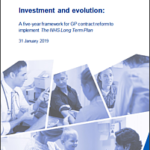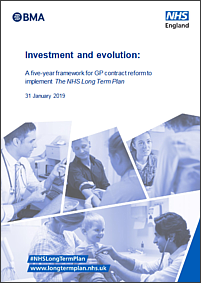The Institute for Voluntary Action Research (IVAR) has developed free support resources for health,  care and voluntary sector leaders who want to drive action through partnership working around the NHS Long Term Plan. The resources include online learning, webinars, workshops, coaching and individual support and are aimed at ICS/STP leads, commissioners, clinicians, and professionals from the voluntary sector.
care and voluntary sector leaders who want to drive action through partnership working around the NHS Long Term Plan. The resources include online learning, webinars, workshops, coaching and individual support and are aimed at ICS/STP leads, commissioners, clinicians, and professionals from the voluntary sector.
The NHS Long Term Plan commits local healthcare systems to working in a new way, including a focus on prevention and reducing health inequalities.…
Read more of this article



 ARMA has been working with the
ARMA has been working with the  Ration Watch aims to expose the scale of rationing and the issues around local commissioning across the UK.…
Ration Watch aims to expose the scale of rationing and the issues around local commissioning across the UK.… 
 Musculoskeletal support professionals in the community
Musculoskeletal support professionals in the community
 Since the NHS Long Term Plan (LTP) was published on 7 January 2019, the NHS Operational Planning and Contracting Guidance 2019/20 has been released. It gives guidance on how the additional funding settlement for the NHS should be used.
Since the NHS Long Term Plan (LTP) was published on 7 January 2019, the NHS Operational Planning and Contracting Guidance 2019/20 has been released. It gives guidance on how the additional funding settlement for the NHS should be used.
 Prevention seems to have been the theme of my February. The possibility that a lot of the pain and disability of MSK conditions might be prevented, and that this is being taken seriously is an exciting prospect. Even where the conditions can’t be prevented, good self-management support can make a big difference to the impact of the condition. The Government is clear that the future sustainability of the NHS depends on prevention, and that it wants to improve healthy life expectancy by at least five extra years, by 2035.…
Prevention seems to have been the theme of my February. The possibility that a lot of the pain and disability of MSK conditions might be prevented, and that this is being taken seriously is an exciting prospect. Even where the conditions can’t be prevented, good self-management support can make a big difference to the impact of the condition. The Government is clear that the future sustainability of the NHS depends on prevention, and that it wants to improve healthy life expectancy by at least five extra years, by 2035.… 

 Since the NHS Long Term Plan (LTP) was published on 7 January 2019, the Universal Personalised Care: Implementing the Comprehensive Model has been published.
Since the NHS Long Term Plan (LTP) was published on 7 January 2019, the Universal Personalised Care: Implementing the Comprehensive Model has been published.

 How to implement the National Back and Radicular Pain Pathway (NBRPP)
How to implement the National Back and Radicular Pain Pathway (NBRPP)